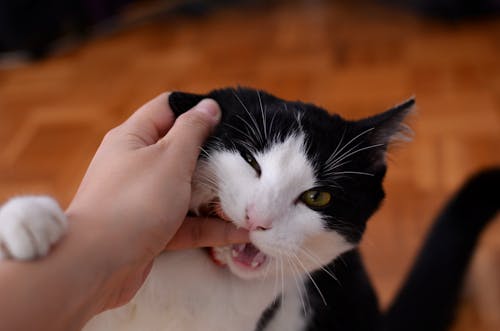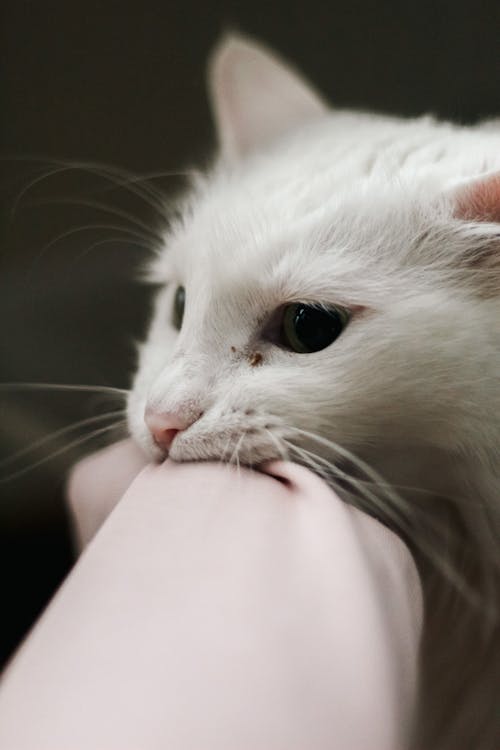Kittens are adorable, playful, and full of energy. However, one common issue that many cat owners face is their kitten's tendency to bite. While this behavior may seem cute or harmless at first, it can quickly become frustrating and even painful if not addressed properly. There are a few key reasons why kittens bite, and with the right approach, you can teach your kitten to stop this behavior.

One of the first steps in curbing your kitten’s biting habit is to address the behavior immediately. If your kitten bites, it's essential to give them gentle but clear feedback. A firm "no" or a slight tap on the forehead can help them understand that biting is not acceptable. Consistency is key here; every time your kitten bites, they need to receive the same corrective response. Afterward, offering a treat or a comforting pet can help ease any stress they may feel and reinforce positive behavior. This method not only teaches your kitten that biting is wrong but also strengthens the bond between you and your pet.
It's also crucial to instill good habits in your kitten from a young age. Kittens are most impressionable during their early months, making it the perfect time to teach them proper behavior. A useful tactic is to use a toy or stuffed animal as a demonstration tool. Pretend to let the toy bite you, then "discipline" the toy by pretending to scold it. Repeating this action a few times in front of your kitten can help them associate biting with undesirable consequences. Over time, this can imprint in their mind that biting is not the correct way to interact with their human companions.
In some cases, a kitten's biting behavior is related to teething. Just like human babies, kittens go through a phase where their gums are sore, and they seek relief by chewing on anything within reach, including their owner's hands or feet. Providing your kitten with appropriate toys, such as chew sticks or small balls, can offer them an outlet for this natural urge. These toys not only help soothe their gums but also keep them engaged, directing their energy away from biting humans and toward more appropriate objects.
Understanding why your kitten bites is the first step in preventing the behavior. Whether it's due to playfulness, teething, or simply a lack of boundaries, addressing it with patience and consistency will help create a happier, more harmonious environment for both you and your furry friend.
Why Do Cats Like to Bite Humans?

Cats, with their enigmatic personalities and quirky behaviors, are beloved pets around the world. However, one behavior that can leave owners puzzled, and sometimes in pain, is their tendency to bite. Whether it's a gentle nip or a sudden bite during playtime, it can be confusing to understand why your feline friend might engage in this behavior. There are several reasons why cats might bite, and understanding these can help improve the bond between you and your pet.
One common reason for biting is play aggression. Cats, especially young ones, are naturally energetic and playful. In the wild, they use their sharp claws and teeth to hunt, pounce, and fight as part of their natural instincts. Even domesticated cats carry these instincts, and playtime is often when they express them. If your cat is getting overly excited during a play session, they may bite as part of their hunting game. It’s important to teach your cat boundaries early on, using toys instead of hands during play to avoid reinforcing this behavior.
Another possible reason cats bite is due to overstimulation. While many cats love petting and cuddling, there is often a limit to how much they can tolerate. This phenomenon, known as "petting-induced aggression," occurs when a cat becomes overwhelmed by too much physical contact. Signs that a cat may be approaching this point include twitching tail, flattened ears, or dilated pupils. If you miss these cues, your cat might respond by biting as a way to tell you they've had enough. Learning to recognize when your cat is feeling overstimulated can help prevent this behavior from escalating.
Cats may also bite as a form of communication. Since they can’t speak, they often use their bodies and actions to convey messages. A quick, gentle bite might be a way for your cat to grab your attention or signal that they want something, like food or playtime. On the other hand, a more forceful or sustained bite could indicate that they’re feeling threatened or anxious. Understanding the context of when and why your cat bites can help you address their needs and emotions more effectively.
Lastly, medical issues can sometimes lead to biting behavior. If a usually calm and gentle cat suddenly becomes more prone to biting, it could be a sign of discomfort or pain. Conditions like dental problems, arthritis, or even skin irritations might cause your cat to lash out when touched. If you notice any sudden changes in behavior, it’s always a good idea to consult with a veterinarian to rule out any underlying health concerns.
In conclusion, cats may bite for various reasons, ranging from playful instincts and overstimulation to communication and medical issues. While this behavior can be frustrating, understanding the root cause is essential in addressing it. By paying close attention to your cat's body language and providing them with the proper outlets for their energy, you can help create a more peaceful and trusting relationship with your feline companion.
What to Do If You Get Bitten by a Cat

Being bitten by a cat can be an unexpected and painful experience. While cats are generally affectionate pets, they may bite for a variety of reasons—ranging from fear and stress to playfulness and overstimulation. Regardless of the cause, it’s important to treat a cat bite with care, as even minor bites can lead to infection if not handled properly. Here's what you should do if you're bitten by a cat:
1. Clean the Wound Immediately
The first step after being bitten by a cat is to thoroughly clean the wound. Cat bites can be particularly dangerous because cats have sharp teeth that can penetrate deep into the skin, introducing bacteria. Use soap and warm water to wash the area for several minutes. This helps to flush out any bacteria that might have entered the wound. You can also use an antiseptic solution, like hydrogen peroxide, to disinfect the area further.
2. Apply Antibiotic Ointment
After cleaning the bite, apply an over-the-counter antibiotic ointment to the wound. This will help to reduce the risk of infection. Cover the bite with a sterile bandage to keep it clean and protect it from dirt or germs that could cause further irritation.
3. Watch for Signs of Infection
Even with immediate care, cat bites can still lead to infection due to the bacteria present in a cat’s mouth, such as Pasteurella or Staphylococcus. Monitor the wound closely in the following days for any signs of infection, including redness, swelling, warmth, or pus. If you develop a fever or the wound becomes increasingly painful, it’s important to seek medical attention.
4. Seek Medical Attention if Needed
If the bite is deep, bleeding heavily, or located near a joint or your face, it’s wise to visit a healthcare provider. Additionally, if you haven’t had a tetanus shot in the last 5-10 years, a booster shot may be recommended, as tetanus can be contracted through open wounds. Your doctor may also prescribe oral antibiotics, particularly if there are signs of infection.
5. Address the Underlying Cause of the Bite
It’s important to understand why the cat bit you, so you can prevent future incidents. Cats may bite out of fear, overstimulation, or in response to pain. If a normally calm cat suddenly becomes aggressive, it could be a sign of illness or injury, and a visit to the vet may be necessary. On the other hand, if the bite occurred during playtime, you may need to redirect your cat's energy by using toys instead of your hands to engage them.
6. Be Cautious with Stray Cats
If you’re bitten by a stray or unknown cat, there’s an additional risk of rabies, especially if you don’t know the cat’s vaccination history. In such cases, it’s crucial to seek immediate medical advice. Rabies is a serious disease, and prompt treatment is necessary to prevent complications.
7. Prevent Future Bites
To avoid being bitten in the future, pay attention to your cat’s body language. Cats usually give warning signs when they’re feeling stressed or overstimulated. Watch for behaviors like flattened ears, a twitching tail, or dilated pupils—these are often indicators that your cat is becoming agitated and may be preparing to bite. Creating a calm and safe environment for your cat can also help reduce anxiety-related bites.
In summary, while cat bites can be painful and potentially dangerous, taking immediate action by cleaning the wound and watching for signs of infection can help reduce complications. If the bite is severe or if you're unsure about your tetanus or rabies risk, it's always best to consult a healthcare professional. By understanding the causes of cat bites and being proactive in your approach to handling them, you can minimize the chances of future incidents.
